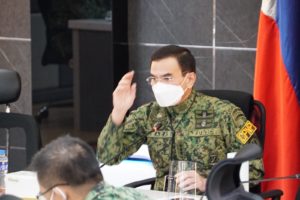The House of Representatives will take up again in its plenary deliberations the proposed economic amendments to the Constitution when Congress resumes session on May 17.
Albay Rep. Joey Salceda, chair of the House ways and means committee, gave assurance that the House won’t insert political provisions in Resolution of both Houses No. 2.
“The House will do its part, that is for certain. But we hope the Senate begins deliberating soon. The timing is efficient, since we could have the plebiscite along with the 2022 elections,” he said.
In a statement on Saturday, Salceda added: “RBH 2 is pure economic reform. We know and understand that any political Charter change (Cha-cha) will be dead on arrival.”
The House official made the remarks a week ahead of Congress’ resumption of session on May 17, after having gone on a break since late March.
The RBH 2, filed by Speaker Lord Allan Velasco, was approved by the House constitutional amendments committee in early February.
It seeks to lift economic restrictions in the Constitution to attract more foreign direct investments to the Philippines and help its battered economy rise from recession.
The measure was the subject of plenary deliberations in March with House constitutional amendments chair and Ako Bicol Rep. Alfredo Garbin responding to solons’ interpellations.
When Congress resumes session in mid-May, the Housewill have until June 4 to pass RBH 2 before Congress goes on sine die adjournment from June 5 to July 25.
Apart from economic Cha-cha, the House will also tackle the proposed Bayanihan 3 bill, whose P405.6-billion package includes P1,000 in cash aid to all Filipinos totaling P216 billion, wage subsidies, cash aid to displaced workers, pension for retired military and uniformed personnel.
Salceda, in renewing his push for RBH 2 as one of its sponsors along with Marikina Rep. Stella Luz Quimbo, reiterated his appeal to legislators to “simply do what already worked for our neighbors” in Southeast Asia.
He cited reforms in liberalizing foreign direct investment in Vietnam, which he said overtook the Philippines because they “opened their economy to the world while we didn’t.”
“The average Vietnamese will be wealthier than the average Filipino over the next decade. You have to remember, this country began poorer than us, had more conflict that we ever had, was nearly completely bombed, and had to rebuild almost from scratch. And yet, they have leapfrogged us,” Salceda said.


